Business Ethics: A Case Study of Volkswagen
VerifiedAdded on 2020/06/03
|15
|4369
|120
AI Summary
This assignment delves into the realm of business ethics by examining the Volkswagen emissions scandal. Students are tasked with analyzing various ethical frameworks and applying them to understand the complexities of this case. The analysis should consider the perspectives of stakeholders involved, such as customers, employees, investors, and regulators. Furthermore, the assignment prompts an evaluation of the company's response to the crisis and potential strategies for restoring ethical integrity.
Contribute Materials
Your contribution can guide someone’s learning journey. Share your
documents today.
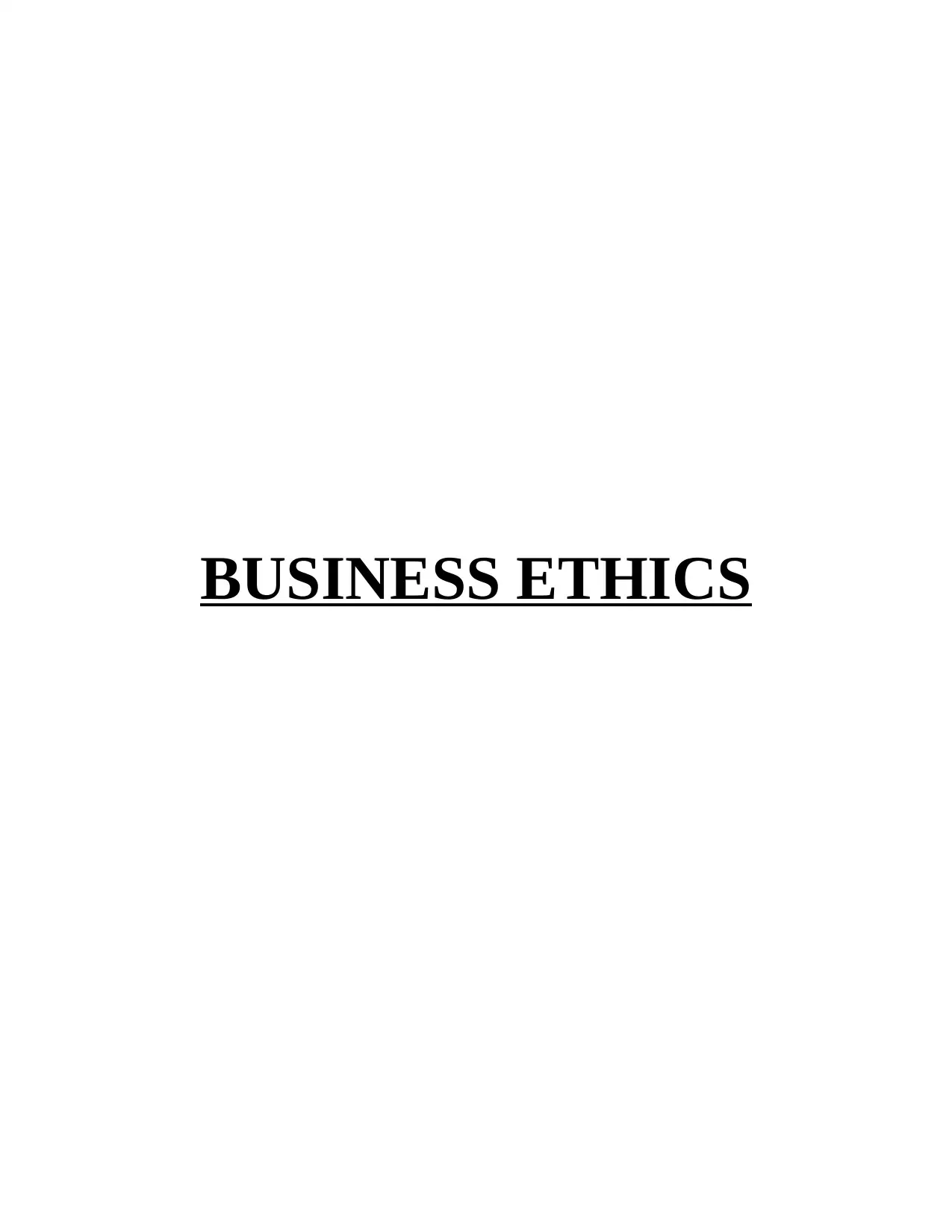
BUSINESS ETHICS
Secure Best Marks with AI Grader
Need help grading? Try our AI Grader for instant feedback on your assignments.
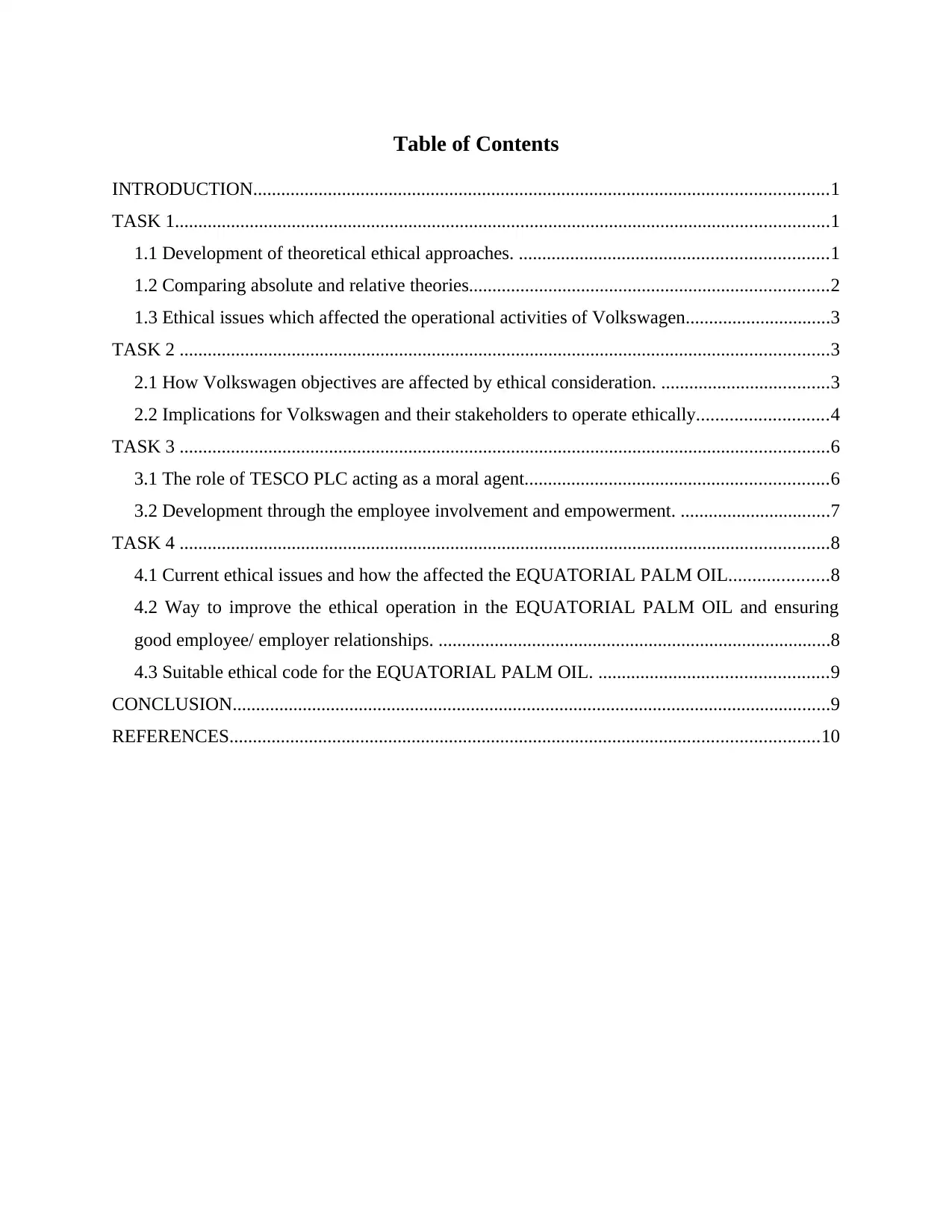
Table of Contents
INTRODUCTION...........................................................................................................................1
TASK 1............................................................................................................................................1
1.1 Development of theoretical ethical approaches. ..................................................................1
1.2 Comparing absolute and relative theories.............................................................................2
1.3 Ethical issues which affected the operational activities of Volkswagen...............................3
TASK 2 ...........................................................................................................................................3
2.1 How Volkswagen objectives are affected by ethical consideration. ....................................3
2.2 Implications for Volkswagen and their stakeholders to operate ethically............................4
TASK 3 ...........................................................................................................................................6
3.1 The role of TESCO PLC acting as a moral agent.................................................................6
3.2 Development through the employee involvement and empowerment. ................................7
TASK 4 ...........................................................................................................................................8
4.1 Current ethical issues and how the affected the EQUATORIAL PALM OIL.....................8
4.2 Way to improve the ethical operation in the EQUATORIAL PALM OIL and ensuring
good employee/ employer relationships. ....................................................................................8
4.3 Suitable ethical code for the EQUATORIAL PALM OIL. .................................................9
CONCLUSION................................................................................................................................9
REFERENCES..............................................................................................................................10
INTRODUCTION...........................................................................................................................1
TASK 1............................................................................................................................................1
1.1 Development of theoretical ethical approaches. ..................................................................1
1.2 Comparing absolute and relative theories.............................................................................2
1.3 Ethical issues which affected the operational activities of Volkswagen...............................3
TASK 2 ...........................................................................................................................................3
2.1 How Volkswagen objectives are affected by ethical consideration. ....................................3
2.2 Implications for Volkswagen and their stakeholders to operate ethically............................4
TASK 3 ...........................................................................................................................................6
3.1 The role of TESCO PLC acting as a moral agent.................................................................6
3.2 Development through the employee involvement and empowerment. ................................7
TASK 4 ...........................................................................................................................................8
4.1 Current ethical issues and how the affected the EQUATORIAL PALM OIL.....................8
4.2 Way to improve the ethical operation in the EQUATORIAL PALM OIL and ensuring
good employee/ employer relationships. ....................................................................................8
4.3 Suitable ethical code for the EQUATORIAL PALM OIL. .................................................9
CONCLUSION................................................................................................................................9
REFERENCES..............................................................................................................................10
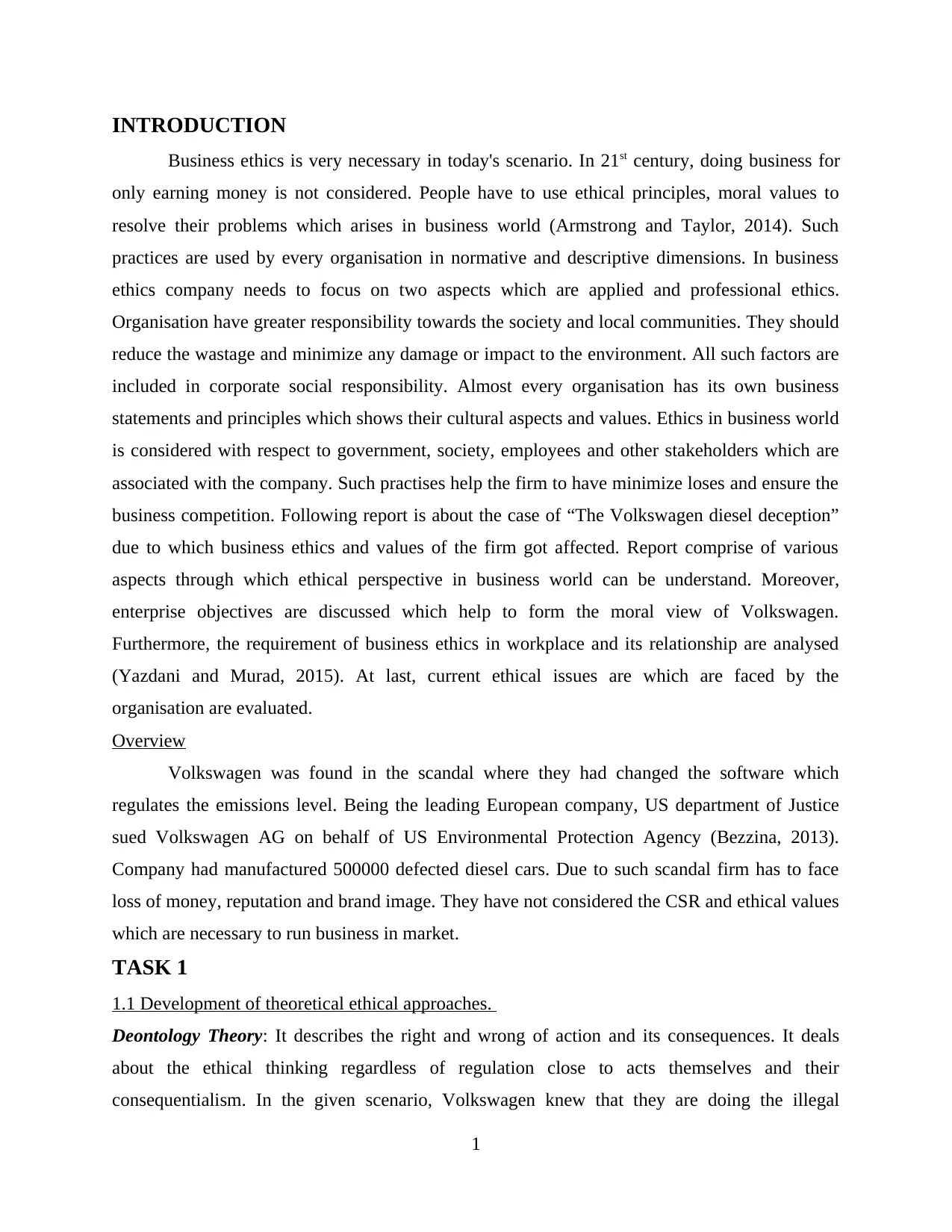
INTRODUCTION
Business ethics is very necessary in today's scenario. In 21st century, doing business for
only earning money is not considered. People have to use ethical principles, moral values to
resolve their problems which arises in business world (Armstrong and Taylor, 2014). Such
practices are used by every organisation in normative and descriptive dimensions. In business
ethics company needs to focus on two aspects which are applied and professional ethics.
Organisation have greater responsibility towards the society and local communities. They should
reduce the wastage and minimize any damage or impact to the environment. All such factors are
included in corporate social responsibility. Almost every organisation has its own business
statements and principles which shows their cultural aspects and values. Ethics in business world
is considered with respect to government, society, employees and other stakeholders which are
associated with the company. Such practises help the firm to have minimize loses and ensure the
business competition. Following report is about the case of “The Volkswagen diesel deception”
due to which business ethics and values of the firm got affected. Report comprise of various
aspects through which ethical perspective in business world can be understand. Moreover,
enterprise objectives are discussed which help to form the moral view of Volkswagen.
Furthermore, the requirement of business ethics in workplace and its relationship are analysed
(Yazdani and Murad, 2015). At last, current ethical issues are which are faced by the
organisation are evaluated.
Overview
Volkswagen was found in the scandal where they had changed the software which
regulates the emissions level. Being the leading European company, US department of Justice
sued Volkswagen AG on behalf of US Environmental Protection Agency (Bezzina, 2013).
Company had manufactured 500000 defected diesel cars. Due to such scandal firm has to face
loss of money, reputation and brand image. They have not considered the CSR and ethical values
which are necessary to run business in market.
TASK 1
1.1 Development of theoretical ethical approaches.
Deontology Theory: It describes the right and wrong of action and its consequences. It deals
about the ethical thinking regardless of regulation close to acts themselves and their
consequentialism. In the given scenario, Volkswagen knew that they are doing the illegal
1
Business ethics is very necessary in today's scenario. In 21st century, doing business for
only earning money is not considered. People have to use ethical principles, moral values to
resolve their problems which arises in business world (Armstrong and Taylor, 2014). Such
practices are used by every organisation in normative and descriptive dimensions. In business
ethics company needs to focus on two aspects which are applied and professional ethics.
Organisation have greater responsibility towards the society and local communities. They should
reduce the wastage and minimize any damage or impact to the environment. All such factors are
included in corporate social responsibility. Almost every organisation has its own business
statements and principles which shows their cultural aspects and values. Ethics in business world
is considered with respect to government, society, employees and other stakeholders which are
associated with the company. Such practises help the firm to have minimize loses and ensure the
business competition. Following report is about the case of “The Volkswagen diesel deception”
due to which business ethics and values of the firm got affected. Report comprise of various
aspects through which ethical perspective in business world can be understand. Moreover,
enterprise objectives are discussed which help to form the moral view of Volkswagen.
Furthermore, the requirement of business ethics in workplace and its relationship are analysed
(Yazdani and Murad, 2015). At last, current ethical issues are which are faced by the
organisation are evaluated.
Overview
Volkswagen was found in the scandal where they had changed the software which
regulates the emissions level. Being the leading European company, US department of Justice
sued Volkswagen AG on behalf of US Environmental Protection Agency (Bezzina, 2013).
Company had manufactured 500000 defected diesel cars. Due to such scandal firm has to face
loss of money, reputation and brand image. They have not considered the CSR and ethical values
which are necessary to run business in market.
TASK 1
1.1 Development of theoretical ethical approaches.
Deontology Theory: It describes the right and wrong of action and its consequences. It deals
about the ethical thinking regardless of regulation close to acts themselves and their
consequentialism. In the given scenario, Volkswagen knew that they are doing the illegal
1
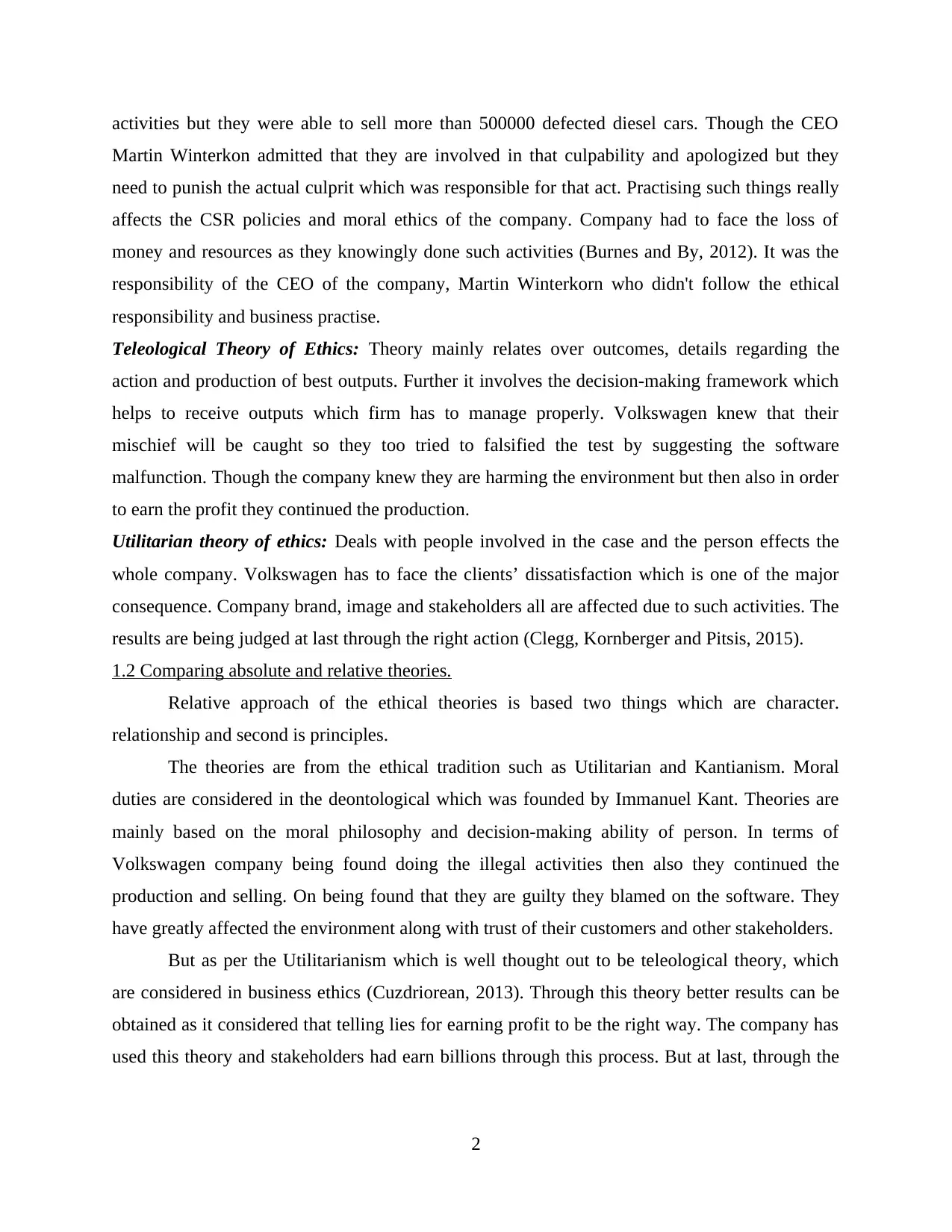
activities but they were able to sell more than 500000 defected diesel cars. Though the CEO
Martin Winterkon admitted that they are involved in that culpability and apologized but they
need to punish the actual culprit which was responsible for that act. Practising such things really
affects the CSR policies and moral ethics of the company. Company had to face the loss of
money and resources as they knowingly done such activities (Burnes and By, 2012). It was the
responsibility of the CEO of the company, Martin Winterkorn who didn't follow the ethical
responsibility and business practise.
Teleological Theory of Ethics: Theory mainly relates over outcomes, details regarding the
action and production of best outputs. Further it involves the decision-making framework which
helps to receive outputs which firm has to manage properly. Volkswagen knew that their
mischief will be caught so they too tried to falsified the test by suggesting the software
malfunction. Though the company knew they are harming the environment but then also in order
to earn the profit they continued the production.
Utilitarian theory of ethics: Deals with people involved in the case and the person effects the
whole company. Volkswagen has to face the clients’ dissatisfaction which is one of the major
consequence. Company brand, image and stakeholders all are affected due to such activities. The
results are being judged at last through the right action (Clegg, Kornberger and Pitsis, 2015).
1.2 Comparing absolute and relative theories.
Relative approach of the ethical theories is based two things which are character.
relationship and second is principles.
The theories are from the ethical tradition such as Utilitarian and Kantianism. Moral
duties are considered in the deontological which was founded by Immanuel Kant. Theories are
mainly based on the moral philosophy and decision-making ability of person. In terms of
Volkswagen company being found doing the illegal activities then also they continued the
production and selling. On being found that they are guilty they blamed on the software. They
have greatly affected the environment along with trust of their customers and other stakeholders.
But as per the Utilitarianism which is well thought out to be teleological theory, which
are considered in business ethics (Cuzdriorean, 2013). Through this theory better results can be
obtained as it considered that telling lies for earning profit to be the right way. The company has
used this theory and stakeholders had earn billions through this process. But at last, through the
2
Martin Winterkon admitted that they are involved in that culpability and apologized but they
need to punish the actual culprit which was responsible for that act. Practising such things really
affects the CSR policies and moral ethics of the company. Company had to face the loss of
money and resources as they knowingly done such activities (Burnes and By, 2012). It was the
responsibility of the CEO of the company, Martin Winterkorn who didn't follow the ethical
responsibility and business practise.
Teleological Theory of Ethics: Theory mainly relates over outcomes, details regarding the
action and production of best outputs. Further it involves the decision-making framework which
helps to receive outputs which firm has to manage properly. Volkswagen knew that their
mischief will be caught so they too tried to falsified the test by suggesting the software
malfunction. Though the company knew they are harming the environment but then also in order
to earn the profit they continued the production.
Utilitarian theory of ethics: Deals with people involved in the case and the person effects the
whole company. Volkswagen has to face the clients’ dissatisfaction which is one of the major
consequence. Company brand, image and stakeholders all are affected due to such activities. The
results are being judged at last through the right action (Clegg, Kornberger and Pitsis, 2015).
1.2 Comparing absolute and relative theories.
Relative approach of the ethical theories is based two things which are character.
relationship and second is principles.
The theories are from the ethical tradition such as Utilitarian and Kantianism. Moral
duties are considered in the deontological which was founded by Immanuel Kant. Theories are
mainly based on the moral philosophy and decision-making ability of person. In terms of
Volkswagen company being found doing the illegal activities then also they continued the
production and selling. On being found that they are guilty they blamed on the software. They
have greatly affected the environment along with trust of their customers and other stakeholders.
But as per the Utilitarianism which is well thought out to be teleological theory, which
are considered in business ethics (Cuzdriorean, 2013). Through this theory better results can be
obtained as it considered that telling lies for earning profit to be the right way. The company has
used this theory and stakeholders had earn billions through this process. But at last, through the
2
Secure Best Marks with AI Grader
Need help grading? Try our AI Grader for instant feedback on your assignments.
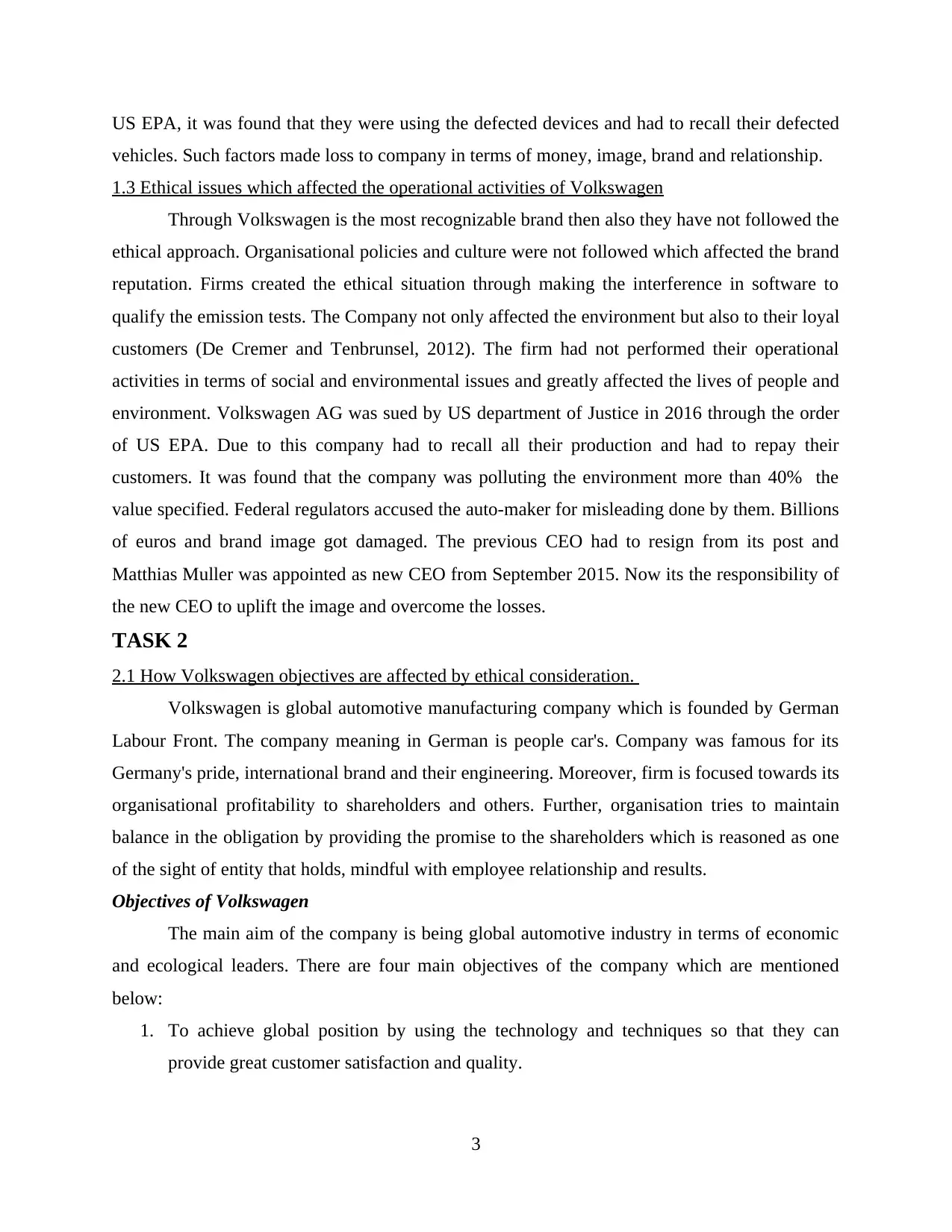
US EPA, it was found that they were using the defected devices and had to recall their defected
vehicles. Such factors made loss to company in terms of money, image, brand and relationship.
1.3 Ethical issues which affected the operational activities of Volkswagen
Through Volkswagen is the most recognizable brand then also they have not followed the
ethical approach. Organisational policies and culture were not followed which affected the brand
reputation. Firms created the ethical situation through making the interference in software to
qualify the emission tests. The Company not only affected the environment but also to their loyal
customers (De Cremer and Tenbrunsel, 2012). The firm had not performed their operational
activities in terms of social and environmental issues and greatly affected the lives of people and
environment. Volkswagen AG was sued by US department of Justice in 2016 through the order
of US EPA. Due to this company had to recall all their production and had to repay their
customers. It was found that the company was polluting the environment more than 40% the
value specified. Federal regulators accused the auto-maker for misleading done by them. Billions
of euros and brand image got damaged. The previous CEO had to resign from its post and
Matthias Muller was appointed as new CEO from September 2015. Now its the responsibility of
the new CEO to uplift the image and overcome the losses.
TASK 2
2.1 How Volkswagen objectives are affected by ethical consideration.
Volkswagen is global automotive manufacturing company which is founded by German
Labour Front. The company meaning in German is people car's. Company was famous for its
Germany's pride, international brand and their engineering. Moreover, firm is focused towards its
organisational profitability to shareholders and others. Further, organisation tries to maintain
balance in the obligation by providing the promise to the shareholders which is reasoned as one
of the sight of entity that holds, mindful with employee relationship and results.
Objectives of Volkswagen
The main aim of the company is being global automotive industry in terms of economic
and ecological leaders. There are four main objectives of the company which are mentioned
below:
1. To achieve global position by using the technology and techniques so that they can
provide great customer satisfaction and quality.
3
vehicles. Such factors made loss to company in terms of money, image, brand and relationship.
1.3 Ethical issues which affected the operational activities of Volkswagen
Through Volkswagen is the most recognizable brand then also they have not followed the
ethical approach. Organisational policies and culture were not followed which affected the brand
reputation. Firms created the ethical situation through making the interference in software to
qualify the emission tests. The Company not only affected the environment but also to their loyal
customers (De Cremer and Tenbrunsel, 2012). The firm had not performed their operational
activities in terms of social and environmental issues and greatly affected the lives of people and
environment. Volkswagen AG was sued by US department of Justice in 2016 through the order
of US EPA. Due to this company had to recall all their production and had to repay their
customers. It was found that the company was polluting the environment more than 40% the
value specified. Federal regulators accused the auto-maker for misleading done by them. Billions
of euros and brand image got damaged. The previous CEO had to resign from its post and
Matthias Muller was appointed as new CEO from September 2015. Now its the responsibility of
the new CEO to uplift the image and overcome the losses.
TASK 2
2.1 How Volkswagen objectives are affected by ethical consideration.
Volkswagen is global automotive manufacturing company which is founded by German
Labour Front. The company meaning in German is people car's. Company was famous for its
Germany's pride, international brand and their engineering. Moreover, firm is focused towards its
organisational profitability to shareholders and others. Further, organisation tries to maintain
balance in the obligation by providing the promise to the shareholders which is reasoned as one
of the sight of entity that holds, mindful with employee relationship and results.
Objectives of Volkswagen
The main aim of the company is being global automotive industry in terms of economic
and ecological leaders. There are four main objectives of the company which are mentioned
below:
1. To achieve global position by using the technology and techniques so that they can
provide great customer satisfaction and quality.
3
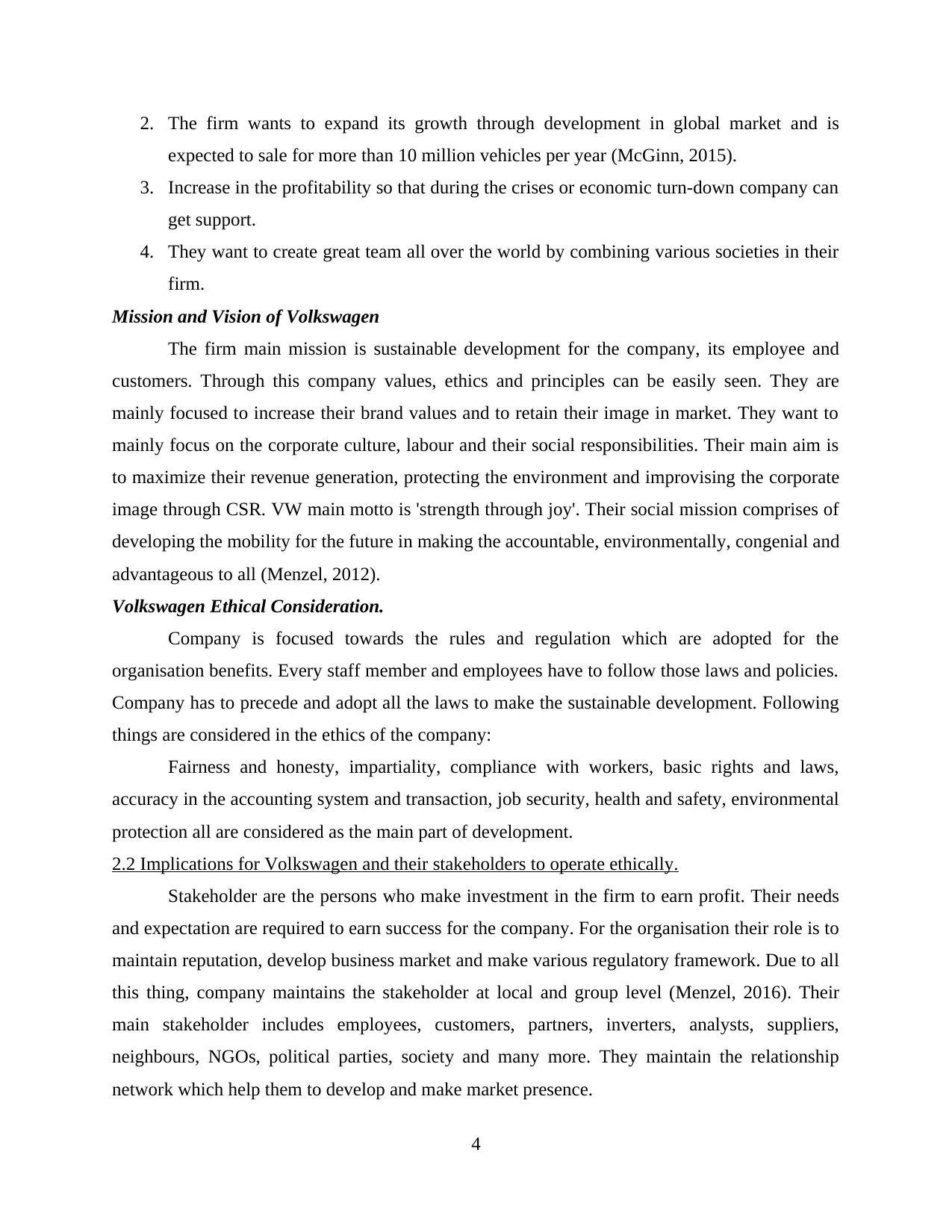
2. The firm wants to expand its growth through development in global market and is
expected to sale for more than 10 million vehicles per year (McGinn, 2015).
3. Increase in the profitability so that during the crises or economic turn-down company can
get support.
4. They want to create great team all over the world by combining various societies in their
firm.
Mission and Vision of Volkswagen
The firm main mission is sustainable development for the company, its employee and
customers. Through this company values, ethics and principles can be easily seen. They are
mainly focused to increase their brand values and to retain their image in market. They want to
mainly focus on the corporate culture, labour and their social responsibilities. Their main aim is
to maximize their revenue generation, protecting the environment and improvising the corporate
image through CSR. VW main motto is 'strength through joy'. Their social mission comprises of
developing the mobility for the future in making the accountable, environmentally, congenial and
advantageous to all (Menzel, 2012).
Volkswagen Ethical Consideration.
Company is focused towards the rules and regulation which are adopted for the
organisation benefits. Every staff member and employees have to follow those laws and policies.
Company has to precede and adopt all the laws to make the sustainable development. Following
things are considered in the ethics of the company:
Fairness and honesty, impartiality, compliance with workers, basic rights and laws,
accuracy in the accounting system and transaction, job security, health and safety, environmental
protection all are considered as the main part of development.
2.2 Implications for Volkswagen and their stakeholders to operate ethically.
Stakeholder are the persons who make investment in the firm to earn profit. Their needs
and expectation are required to earn success for the company. For the organisation their role is to
maintain reputation, develop business market and make various regulatory framework. Due to all
this thing, company maintains the stakeholder at local and group level (Menzel, 2016). Their
main stakeholder includes employees, customers, partners, inverters, analysts, suppliers,
neighbours, NGOs, political parties, society and many more. They maintain the relationship
network which help them to develop and make market presence.
4
expected to sale for more than 10 million vehicles per year (McGinn, 2015).
3. Increase in the profitability so that during the crises or economic turn-down company can
get support.
4. They want to create great team all over the world by combining various societies in their
firm.
Mission and Vision of Volkswagen
The firm main mission is sustainable development for the company, its employee and
customers. Through this company values, ethics and principles can be easily seen. They are
mainly focused to increase their brand values and to retain their image in market. They want to
mainly focus on the corporate culture, labour and their social responsibilities. Their main aim is
to maximize their revenue generation, protecting the environment and improvising the corporate
image through CSR. VW main motto is 'strength through joy'. Their social mission comprises of
developing the mobility for the future in making the accountable, environmentally, congenial and
advantageous to all (Menzel, 2012).
Volkswagen Ethical Consideration.
Company is focused towards the rules and regulation which are adopted for the
organisation benefits. Every staff member and employees have to follow those laws and policies.
Company has to precede and adopt all the laws to make the sustainable development. Following
things are considered in the ethics of the company:
Fairness and honesty, impartiality, compliance with workers, basic rights and laws,
accuracy in the accounting system and transaction, job security, health and safety, environmental
protection all are considered as the main part of development.
2.2 Implications for Volkswagen and their stakeholders to operate ethically.
Stakeholder are the persons who make investment in the firm to earn profit. Their needs
and expectation are required to earn success for the company. For the organisation their role is to
maintain reputation, develop business market and make various regulatory framework. Due to all
this thing, company maintains the stakeholder at local and group level (Menzel, 2016). Their
main stakeholder includes employees, customers, partners, inverters, analysts, suppliers,
neighbours, NGOs, political parties, society and many more. They maintain the relationship
network which help them to develop and make market presence.
4
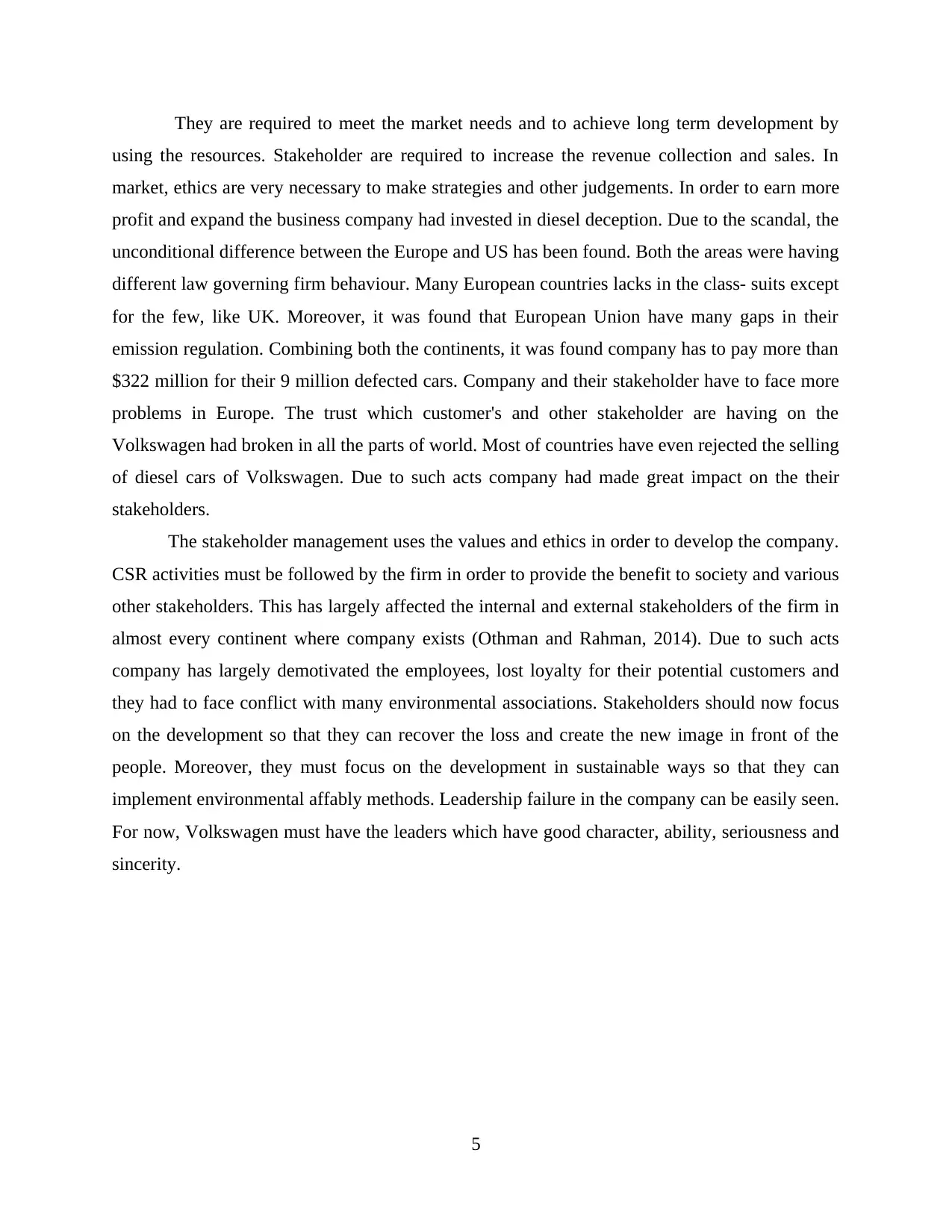
They are required to meet the market needs and to achieve long term development by
using the resources. Stakeholder are required to increase the revenue collection and sales. In
market, ethics are very necessary to make strategies and other judgements. In order to earn more
profit and expand the business company had invested in diesel deception. Due to the scandal, the
unconditional difference between the Europe and US has been found. Both the areas were having
different law governing firm behaviour. Many European countries lacks in the class- suits except
for the few, like UK. Moreover, it was found that European Union have many gaps in their
emission regulation. Combining both the continents, it was found company has to pay more than
$322 million for their 9 million defected cars. Company and their stakeholder have to face more
problems in Europe. The trust which customer's and other stakeholder are having on the
Volkswagen had broken in all the parts of world. Most of countries have even rejected the selling
of diesel cars of Volkswagen. Due to such acts company had made great impact on the their
stakeholders.
The stakeholder management uses the values and ethics in order to develop the company.
CSR activities must be followed by the firm in order to provide the benefit to society and various
other stakeholders. This has largely affected the internal and external stakeholders of the firm in
almost every continent where company exists (Othman and Rahman, 2014). Due to such acts
company has largely demotivated the employees, lost loyalty for their potential customers and
they had to face conflict with many environmental associations. Stakeholders should now focus
on the development so that they can recover the loss and create the new image in front of the
people. Moreover, they must focus on the development in sustainable ways so that they can
implement environmental affably methods. Leadership failure in the company can be easily seen.
For now, Volkswagen must have the leaders which have good character, ability, seriousness and
sincerity.
5
using the resources. Stakeholder are required to increase the revenue collection and sales. In
market, ethics are very necessary to make strategies and other judgements. In order to earn more
profit and expand the business company had invested in diesel deception. Due to the scandal, the
unconditional difference between the Europe and US has been found. Both the areas were having
different law governing firm behaviour. Many European countries lacks in the class- suits except
for the few, like UK. Moreover, it was found that European Union have many gaps in their
emission regulation. Combining both the continents, it was found company has to pay more than
$322 million for their 9 million defected cars. Company and their stakeholder have to face more
problems in Europe. The trust which customer's and other stakeholder are having on the
Volkswagen had broken in all the parts of world. Most of countries have even rejected the selling
of diesel cars of Volkswagen. Due to such acts company had made great impact on the their
stakeholders.
The stakeholder management uses the values and ethics in order to develop the company.
CSR activities must be followed by the firm in order to provide the benefit to society and various
other stakeholders. This has largely affected the internal and external stakeholders of the firm in
almost every continent where company exists (Othman and Rahman, 2014). Due to such acts
company has largely demotivated the employees, lost loyalty for their potential customers and
they had to face conflict with many environmental associations. Stakeholders should now focus
on the development so that they can recover the loss and create the new image in front of the
people. Moreover, they must focus on the development in sustainable ways so that they can
implement environmental affably methods. Leadership failure in the company can be easily seen.
For now, Volkswagen must have the leaders which have good character, ability, seriousness and
sincerity.
5
Paraphrase This Document
Need a fresh take? Get an instant paraphrase of this document with our AI Paraphraser
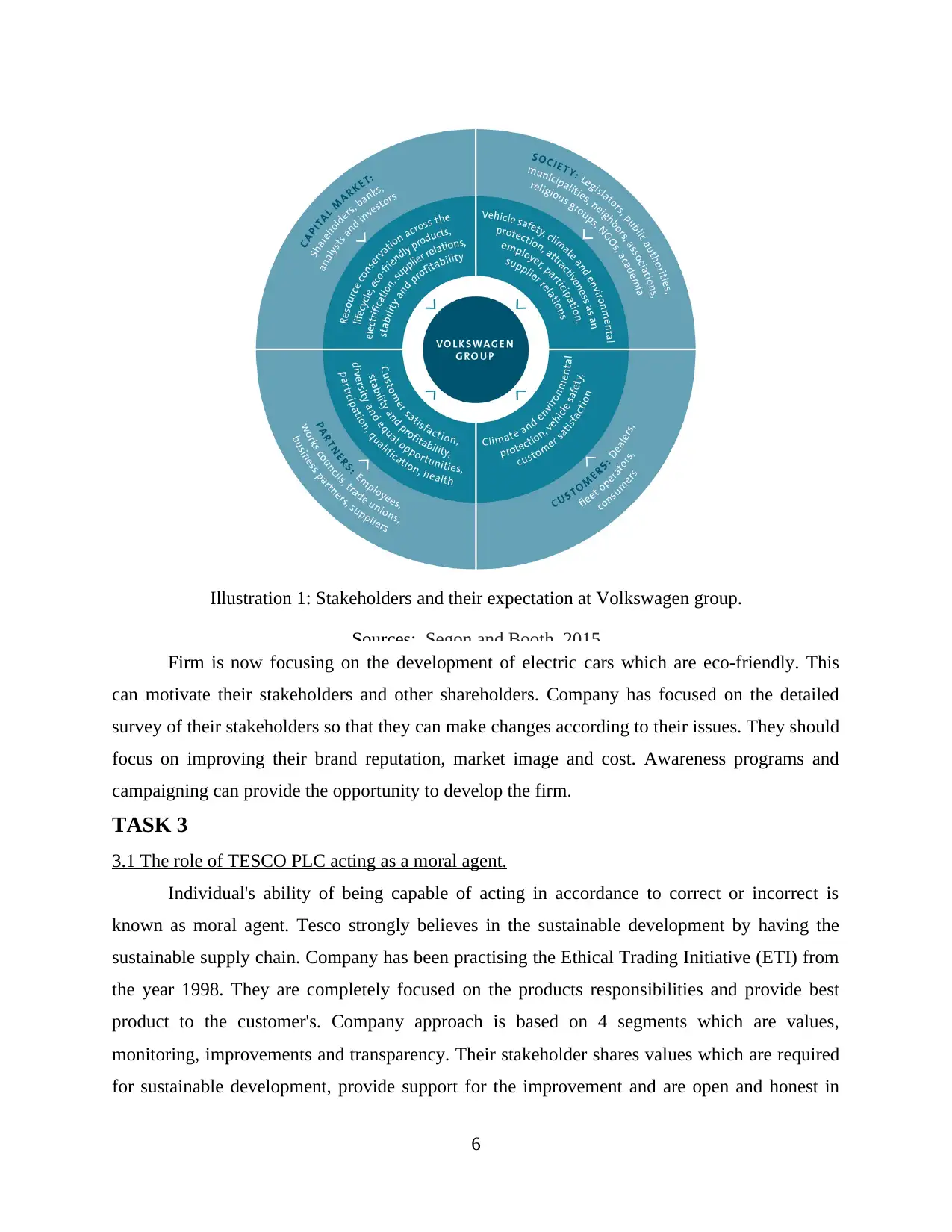
Firm is now focusing on the development of electric cars which are eco-friendly. This
can motivate their stakeholders and other shareholders. Company has focused on the detailed
survey of their stakeholders so that they can make changes according to their issues. They should
focus on improving their brand reputation, market image and cost. Awareness programs and
campaigning can provide the opportunity to develop the firm.
TASK 3
3.1 The role of TESCO PLC acting as a moral agent.
Individual's ability of being capable of acting in accordance to correct or incorrect is
known as moral agent. Tesco strongly believes in the sustainable development by having the
sustainable supply chain. Company has been practising the Ethical Trading Initiative (ETI) from
the year 1998. They are completely focused on the products responsibilities and provide best
product to the customer's. Company approach is based on 4 segments which are values,
monitoring, improvements and transparency. Their stakeholder shares values which are required
for sustainable development, provide support for the improvement and are open and honest in
6
Illustration 1: Stakeholders and their expectation at Volkswagen group.
Sources: Segon and Booth, 2015
can motivate their stakeholders and other shareholders. Company has focused on the detailed
survey of their stakeholders so that they can make changes according to their issues. They should
focus on improving their brand reputation, market image and cost. Awareness programs and
campaigning can provide the opportunity to develop the firm.
TASK 3
3.1 The role of TESCO PLC acting as a moral agent.
Individual's ability of being capable of acting in accordance to correct or incorrect is
known as moral agent. Tesco strongly believes in the sustainable development by having the
sustainable supply chain. Company has been practising the Ethical Trading Initiative (ETI) from
the year 1998. They are completely focused on the products responsibilities and provide best
product to the customer's. Company approach is based on 4 segments which are values,
monitoring, improvements and transparency. Their stakeholder shares values which are required
for sustainable development, provide support for the improvement and are open and honest in
6
Illustration 1: Stakeholders and their expectation at Volkswagen group.
Sources: Segon and Booth, 2015
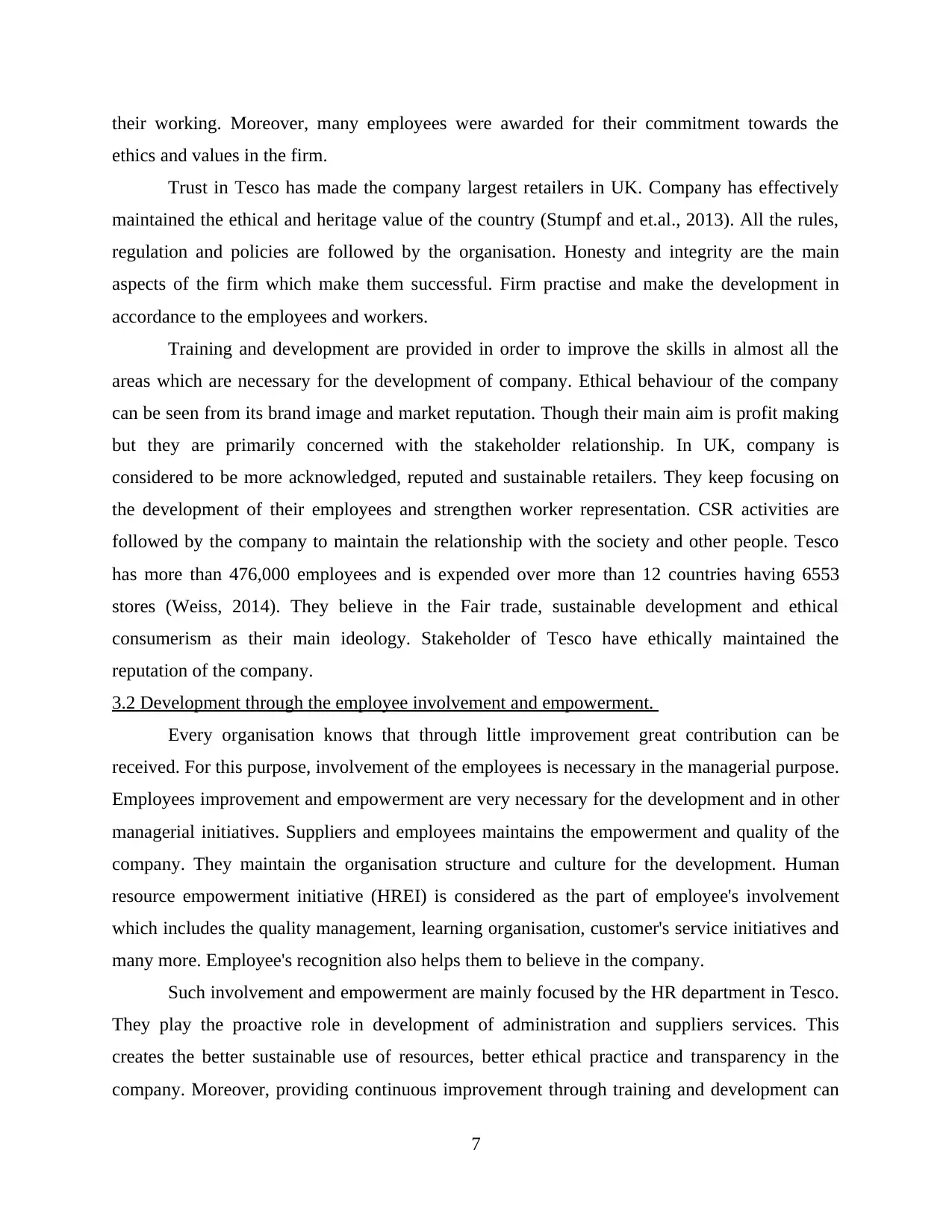
their working. Moreover, many employees were awarded for their commitment towards the
ethics and values in the firm.
Trust in Tesco has made the company largest retailers in UK. Company has effectively
maintained the ethical and heritage value of the country (Stumpf and et.al., 2013). All the rules,
regulation and policies are followed by the organisation. Honesty and integrity are the main
aspects of the firm which make them successful. Firm practise and make the development in
accordance to the employees and workers.
Training and development are provided in order to improve the skills in almost all the
areas which are necessary for the development of company. Ethical behaviour of the company
can be seen from its brand image and market reputation. Though their main aim is profit making
but they are primarily concerned with the stakeholder relationship. In UK, company is
considered to be more acknowledged, reputed and sustainable retailers. They keep focusing on
the development of their employees and strengthen worker representation. CSR activities are
followed by the company to maintain the relationship with the society and other people. Tesco
has more than 476,000 employees and is expended over more than 12 countries having 6553
stores (Weiss, 2014). They believe in the Fair trade, sustainable development and ethical
consumerism as their main ideology. Stakeholder of Tesco have ethically maintained the
reputation of the company.
3.2 Development through the employee involvement and empowerment.
Every organisation knows that through little improvement great contribution can be
received. For this purpose, involvement of the employees is necessary in the managerial purpose.
Employees improvement and empowerment are very necessary for the development and in other
managerial initiatives. Suppliers and employees maintains the empowerment and quality of the
company. They maintain the organisation structure and culture for the development. Human
resource empowerment initiative (HREI) is considered as the part of employee's involvement
which includes the quality management, learning organisation, customer's service initiatives and
many more. Employee's recognition also helps them to believe in the company.
Such involvement and empowerment are mainly focused by the HR department in Tesco.
They play the proactive role in development of administration and suppliers services. This
creates the better sustainable use of resources, better ethical practice and transparency in the
company. Moreover, providing continuous improvement through training and development can
7
ethics and values in the firm.
Trust in Tesco has made the company largest retailers in UK. Company has effectively
maintained the ethical and heritage value of the country (Stumpf and et.al., 2013). All the rules,
regulation and policies are followed by the organisation. Honesty and integrity are the main
aspects of the firm which make them successful. Firm practise and make the development in
accordance to the employees and workers.
Training and development are provided in order to improve the skills in almost all the
areas which are necessary for the development of company. Ethical behaviour of the company
can be seen from its brand image and market reputation. Though their main aim is profit making
but they are primarily concerned with the stakeholder relationship. In UK, company is
considered to be more acknowledged, reputed and sustainable retailers. They keep focusing on
the development of their employees and strengthen worker representation. CSR activities are
followed by the company to maintain the relationship with the society and other people. Tesco
has more than 476,000 employees and is expended over more than 12 countries having 6553
stores (Weiss, 2014). They believe in the Fair trade, sustainable development and ethical
consumerism as their main ideology. Stakeholder of Tesco have ethically maintained the
reputation of the company.
3.2 Development through the employee involvement and empowerment.
Every organisation knows that through little improvement great contribution can be
received. For this purpose, involvement of the employees is necessary in the managerial purpose.
Employees improvement and empowerment are very necessary for the development and in other
managerial initiatives. Suppliers and employees maintains the empowerment and quality of the
company. They maintain the organisation structure and culture for the development. Human
resource empowerment initiative (HREI) is considered as the part of employee's involvement
which includes the quality management, learning organisation, customer's service initiatives and
many more. Employee's recognition also helps them to believe in the company.
Such involvement and empowerment are mainly focused by the HR department in Tesco.
They play the proactive role in development of administration and suppliers services. This
creates the better sustainable use of resources, better ethical practice and transparency in the
company. Moreover, providing continuous improvement through training and development can
7
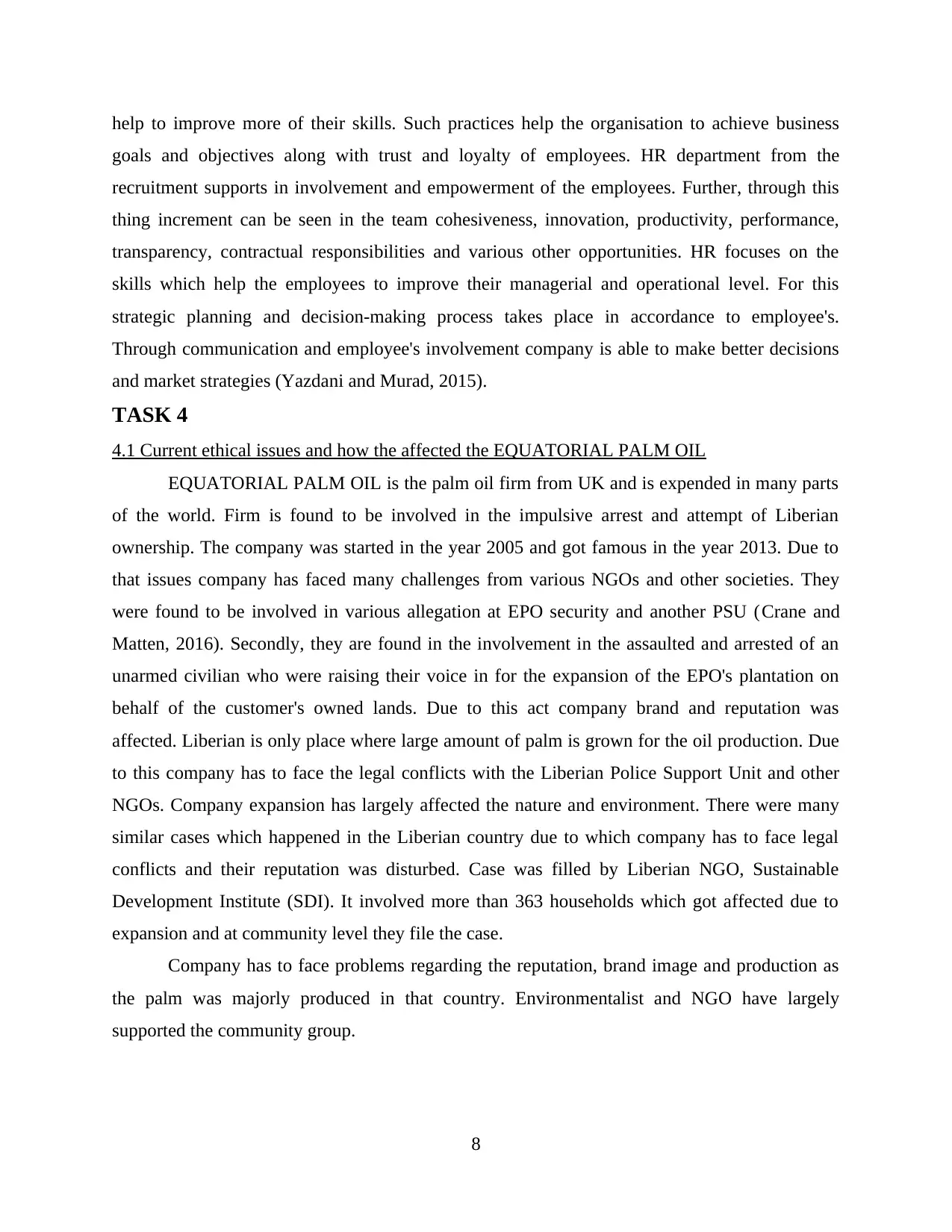
help to improve more of their skills. Such practices help the organisation to achieve business
goals and objectives along with trust and loyalty of employees. HR department from the
recruitment supports in involvement and empowerment of the employees. Further, through this
thing increment can be seen in the team cohesiveness, innovation, productivity, performance,
transparency, contractual responsibilities and various other opportunities. HR focuses on the
skills which help the employees to improve their managerial and operational level. For this
strategic planning and decision-making process takes place in accordance to employee's.
Through communication and employee's involvement company is able to make better decisions
and market strategies (Yazdani and Murad, 2015).
TASK 4
4.1 Current ethical issues and how the affected the EQUATORIAL PALM OIL
EQUATORIAL PALM OIL is the palm oil firm from UK and is expended in many parts
of the world. Firm is found to be involved in the impulsive arrest and attempt of Liberian
ownership. The company was started in the year 2005 and got famous in the year 2013. Due to
that issues company has faced many challenges from various NGOs and other societies. They
were found to be involved in various allegation at EPO security and another PSU (Crane and
Matten, 2016). Secondly, they are found in the involvement in the assaulted and arrested of an
unarmed civilian who were raising their voice in for the expansion of the EPO's plantation on
behalf of the customer's owned lands. Due to this act company brand and reputation was
affected. Liberian is only place where large amount of palm is grown for the oil production. Due
to this company has to face the legal conflicts with the Liberian Police Support Unit and other
NGOs. Company expansion has largely affected the nature and environment. There were many
similar cases which happened in the Liberian country due to which company has to face legal
conflicts and their reputation was disturbed. Case was filled by Liberian NGO, Sustainable
Development Institute (SDI). It involved more than 363 households which got affected due to
expansion and at community level they file the case.
Company has to face problems regarding the reputation, brand image and production as
the palm was majorly produced in that country. Environmentalist and NGO have largely
supported the community group.
8
goals and objectives along with trust and loyalty of employees. HR department from the
recruitment supports in involvement and empowerment of the employees. Further, through this
thing increment can be seen in the team cohesiveness, innovation, productivity, performance,
transparency, contractual responsibilities and various other opportunities. HR focuses on the
skills which help the employees to improve their managerial and operational level. For this
strategic planning and decision-making process takes place in accordance to employee's.
Through communication and employee's involvement company is able to make better decisions
and market strategies (Yazdani and Murad, 2015).
TASK 4
4.1 Current ethical issues and how the affected the EQUATORIAL PALM OIL
EQUATORIAL PALM OIL is the palm oil firm from UK and is expended in many parts
of the world. Firm is found to be involved in the impulsive arrest and attempt of Liberian
ownership. The company was started in the year 2005 and got famous in the year 2013. Due to
that issues company has faced many challenges from various NGOs and other societies. They
were found to be involved in various allegation at EPO security and another PSU (Crane and
Matten, 2016). Secondly, they are found in the involvement in the assaulted and arrested of an
unarmed civilian who were raising their voice in for the expansion of the EPO's plantation on
behalf of the customer's owned lands. Due to this act company brand and reputation was
affected. Liberian is only place where large amount of palm is grown for the oil production. Due
to this company has to face the legal conflicts with the Liberian Police Support Unit and other
NGOs. Company expansion has largely affected the nature and environment. There were many
similar cases which happened in the Liberian country due to which company has to face legal
conflicts and their reputation was disturbed. Case was filled by Liberian NGO, Sustainable
Development Institute (SDI). It involved more than 363 households which got affected due to
expansion and at community level they file the case.
Company has to face problems regarding the reputation, brand image and production as
the palm was majorly produced in that country. Environmentalist and NGO have largely
supported the community group.
8
Secure Best Marks with AI Grader
Need help grading? Try our AI Grader for instant feedback on your assignments.
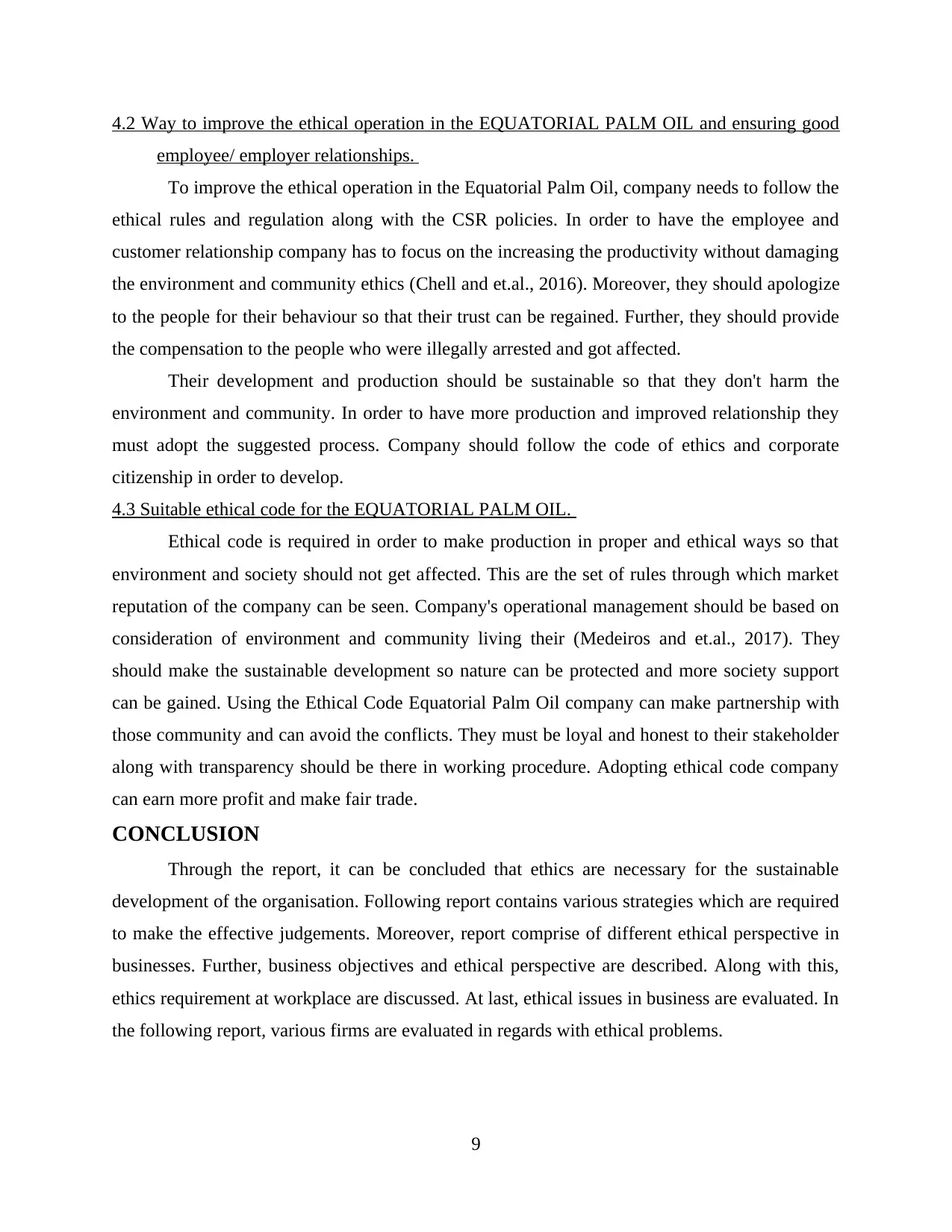
4.2 Way to improve the ethical operation in the EQUATORIAL PALM OIL and ensuring good
employee/ employer relationships.
To improve the ethical operation in the Equatorial Palm Oil, company needs to follow the
ethical rules and regulation along with the CSR policies. In order to have the employee and
customer relationship company has to focus on the increasing the productivity without damaging
the environment and community ethics (Chell and et.al., 2016). Moreover, they should apologize
to the people for their behaviour so that their trust can be regained. Further, they should provide
the compensation to the people who were illegally arrested and got affected.
Their development and production should be sustainable so that they don't harm the
environment and community. In order to have more production and improved relationship they
must adopt the suggested process. Company should follow the code of ethics and corporate
citizenship in order to develop.
4.3 Suitable ethical code for the EQUATORIAL PALM OIL.
Ethical code is required in order to make production in proper and ethical ways so that
environment and society should not get affected. This are the set of rules through which market
reputation of the company can be seen. Company's operational management should be based on
consideration of environment and community living their (Medeiros and et.al., 2017). They
should make the sustainable development so nature can be protected and more society support
can be gained. Using the Ethical Code Equatorial Palm Oil company can make partnership with
those community and can avoid the conflicts. They must be loyal and honest to their stakeholder
along with transparency should be there in working procedure. Adopting ethical code company
can earn more profit and make fair trade.
CONCLUSION
Through the report, it can be concluded that ethics are necessary for the sustainable
development of the organisation. Following report contains various strategies which are required
to make the effective judgements. Moreover, report comprise of different ethical perspective in
businesses. Further, business objectives and ethical perspective are described. Along with this,
ethics requirement at workplace are discussed. At last, ethical issues in business are evaluated. In
the following report, various firms are evaluated in regards with ethical problems.
9
employee/ employer relationships.
To improve the ethical operation in the Equatorial Palm Oil, company needs to follow the
ethical rules and regulation along with the CSR policies. In order to have the employee and
customer relationship company has to focus on the increasing the productivity without damaging
the environment and community ethics (Chell and et.al., 2016). Moreover, they should apologize
to the people for their behaviour so that their trust can be regained. Further, they should provide
the compensation to the people who were illegally arrested and got affected.
Their development and production should be sustainable so that they don't harm the
environment and community. In order to have more production and improved relationship they
must adopt the suggested process. Company should follow the code of ethics and corporate
citizenship in order to develop.
4.3 Suitable ethical code for the EQUATORIAL PALM OIL.
Ethical code is required in order to make production in proper and ethical ways so that
environment and society should not get affected. This are the set of rules through which market
reputation of the company can be seen. Company's operational management should be based on
consideration of environment and community living their (Medeiros and et.al., 2017). They
should make the sustainable development so nature can be protected and more society support
can be gained. Using the Ethical Code Equatorial Palm Oil company can make partnership with
those community and can avoid the conflicts. They must be loyal and honest to their stakeholder
along with transparency should be there in working procedure. Adopting ethical code company
can earn more profit and make fair trade.
CONCLUSION
Through the report, it can be concluded that ethics are necessary for the sustainable
development of the organisation. Following report contains various strategies which are required
to make the effective judgements. Moreover, report comprise of different ethical perspective in
businesses. Further, business objectives and ethical perspective are described. Along with this,
ethics requirement at workplace are discussed. At last, ethical issues in business are evaluated. In
the following report, various firms are evaluated in regards with ethical problems.
9

10
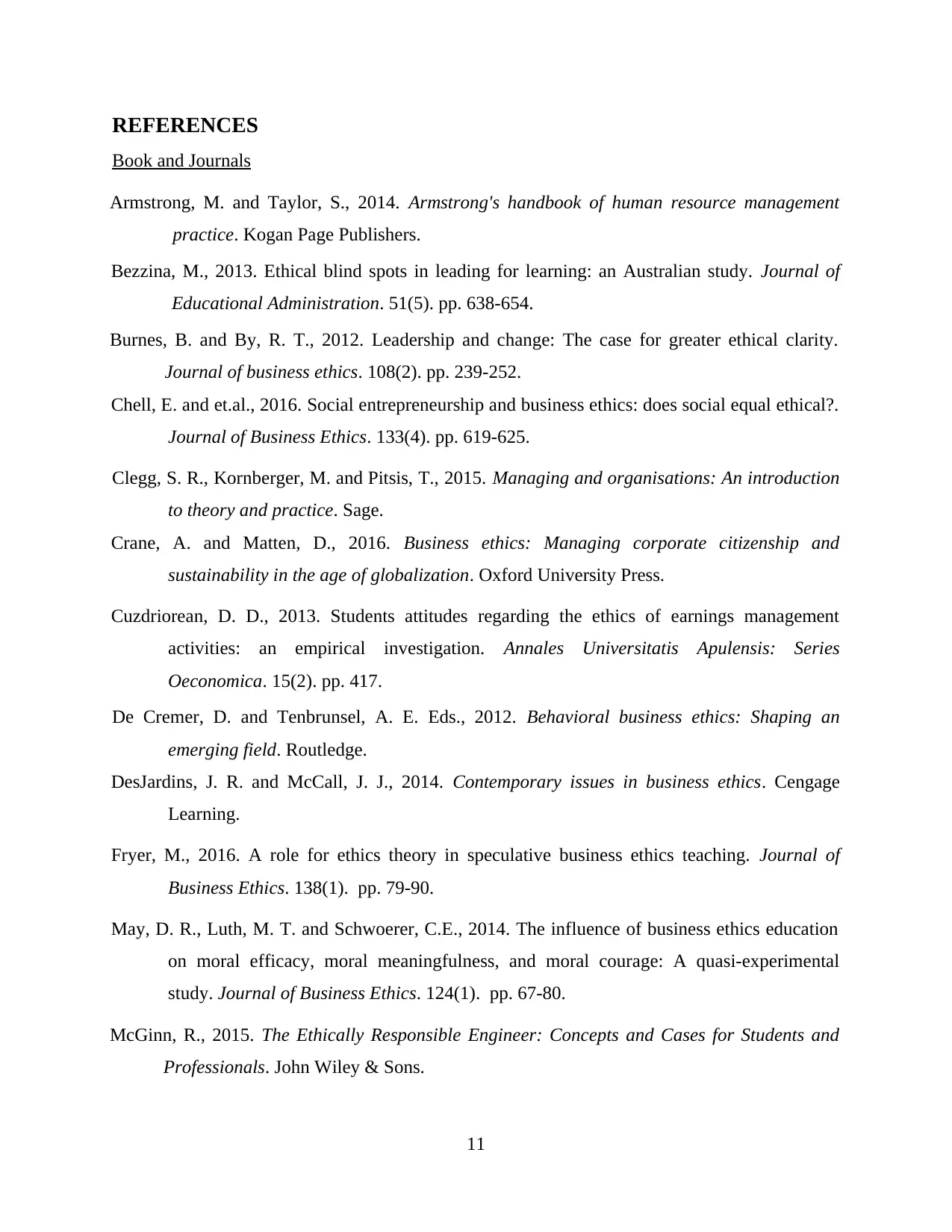
REFERENCES
Book and Journals
Armstrong, M. and Taylor, S., 2014. Armstrong's handbook of human resource management
practice. Kogan Page Publishers.
Bezzina, M., 2013. Ethical blind spots in leading for learning: an Australian study. Journal of
Educational Administration. 51(5). pp. 638-654.
Burnes, B. and By, R. T., 2012. Leadership and change: The case for greater ethical clarity.
Journal of business ethics. 108(2). pp. 239-252.
Chell, E. and et.al., 2016. Social entrepreneurship and business ethics: does social equal ethical?.
Journal of Business Ethics. 133(4). pp. 619-625.
Clegg, S. R., Kornberger, M. and Pitsis, T., 2015. Managing and organisations: An introduction
to theory and practice. Sage.
Crane, A. and Matten, D., 2016. Business ethics: Managing corporate citizenship and
sustainability in the age of globalization. Oxford University Press.
Cuzdriorean, D. D., 2013. Students attitudes regarding the ethics of earnings management
activities: an empirical investigation. Annales Universitatis Apulensis: Series
Oeconomica. 15(2). pp. 417.
De Cremer, D. and Tenbrunsel, A. E. Eds., 2012. Behavioral business ethics: Shaping an
emerging field. Routledge.
DesJardins, J. R. and McCall, J. J., 2014. Contemporary issues in business ethics. Cengage
Learning.
Fryer, M., 2016. A role for ethics theory in speculative business ethics teaching. Journal of
Business Ethics. 138(1). pp. 79-90.
May, D. R., Luth, M. T. and Schwoerer, C.E., 2014. The influence of business ethics education
on moral efficacy, moral meaningfulness, and moral courage: A quasi-experimental
study. Journal of Business Ethics. 124(1). pp. 67-80.
McGinn, R., 2015. The Ethically Responsible Engineer: Concepts and Cases for Students and
Professionals. John Wiley & Sons.
11
Book and Journals
Armstrong, M. and Taylor, S., 2014. Armstrong's handbook of human resource management
practice. Kogan Page Publishers.
Bezzina, M., 2013. Ethical blind spots in leading for learning: an Australian study. Journal of
Educational Administration. 51(5). pp. 638-654.
Burnes, B. and By, R. T., 2012. Leadership and change: The case for greater ethical clarity.
Journal of business ethics. 108(2). pp. 239-252.
Chell, E. and et.al., 2016. Social entrepreneurship and business ethics: does social equal ethical?.
Journal of Business Ethics. 133(4). pp. 619-625.
Clegg, S. R., Kornberger, M. and Pitsis, T., 2015. Managing and organisations: An introduction
to theory and practice. Sage.
Crane, A. and Matten, D., 2016. Business ethics: Managing corporate citizenship and
sustainability in the age of globalization. Oxford University Press.
Cuzdriorean, D. D., 2013. Students attitudes regarding the ethics of earnings management
activities: an empirical investigation. Annales Universitatis Apulensis: Series
Oeconomica. 15(2). pp. 417.
De Cremer, D. and Tenbrunsel, A. E. Eds., 2012. Behavioral business ethics: Shaping an
emerging field. Routledge.
DesJardins, J. R. and McCall, J. J., 2014. Contemporary issues in business ethics. Cengage
Learning.
Fryer, M., 2016. A role for ethics theory in speculative business ethics teaching. Journal of
Business Ethics. 138(1). pp. 79-90.
May, D. R., Luth, M. T. and Schwoerer, C.E., 2014. The influence of business ethics education
on moral efficacy, moral meaningfulness, and moral courage: A quasi-experimental
study. Journal of Business Ethics. 124(1). pp. 67-80.
McGinn, R., 2015. The Ethically Responsible Engineer: Concepts and Cases for Students and
Professionals. John Wiley & Sons.
11
Paraphrase This Document
Need a fresh take? Get an instant paraphrase of this document with our AI Paraphraser
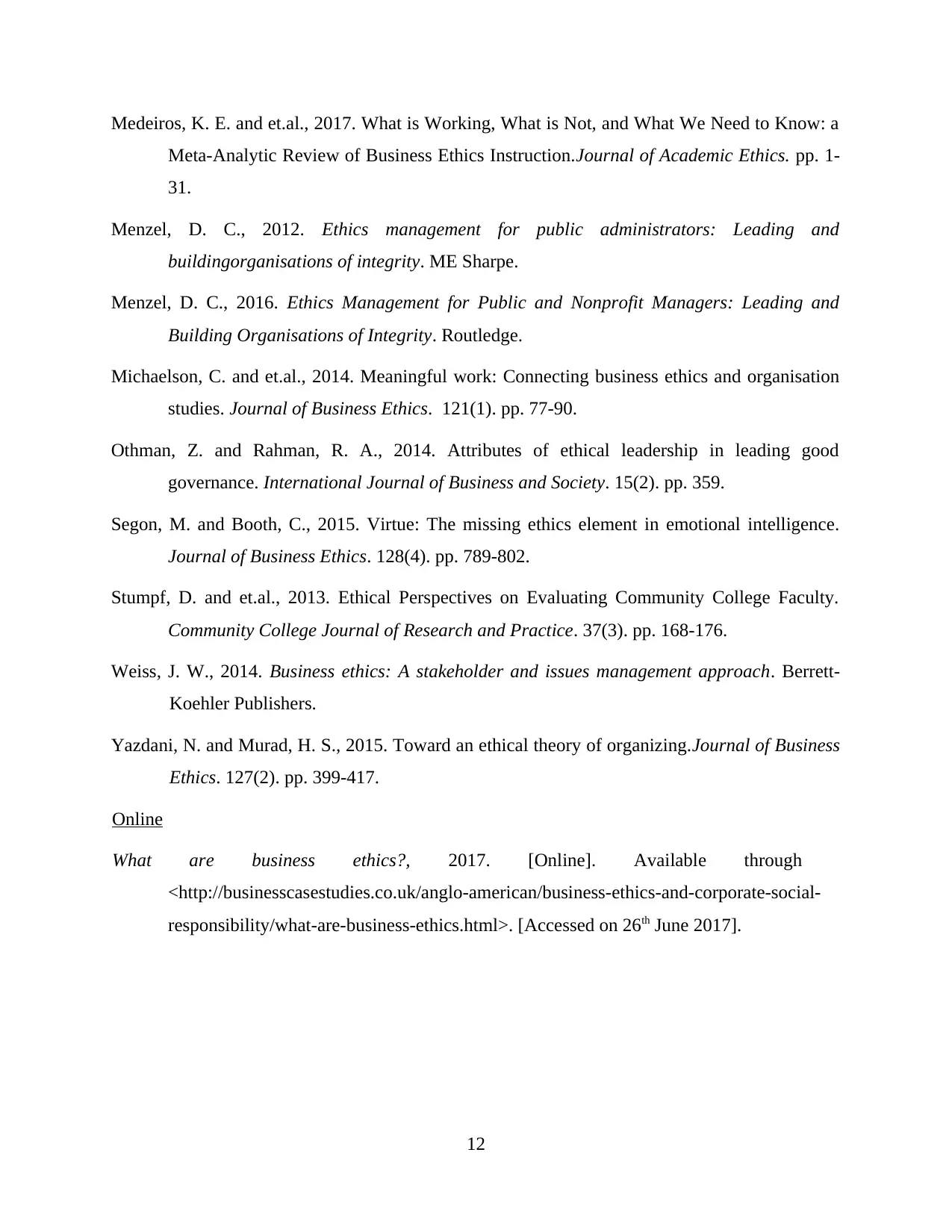
Medeiros, K. E. and et.al., 2017. What is Working, What is Not, and What We Need to Know: a
Meta-Analytic Review of Business Ethics Instruction.Journal of Academic Ethics. pp. 1-
31.
Menzel, D. C., 2012. Ethics management for public administrators: Leading and
buildingorganisations of integrity. ME Sharpe.
Menzel, D. C., 2016. Ethics Management for Public and Nonprofit Managers: Leading and
Building Organisations of Integrity. Routledge.
Michaelson, C. and et.al., 2014. Meaningful work: Connecting business ethics and organisation
studies. Journal of Business Ethics. 121(1). pp. 77-90.
Othman, Z. and Rahman, R. A., 2014. Attributes of ethical leadership in leading good
governance. International Journal of Business and Society. 15(2). pp. 359.
Segon, M. and Booth, C., 2015. Virtue: The missing ethics element in emotional intelligence.
Journal of Business Ethics. 128(4). pp. 789-802.
Stumpf, D. and et.al., 2013. Ethical Perspectives on Evaluating Community College Faculty.
Community College Journal of Research and Practice. 37(3). pp. 168-176.
Weiss, J. W., 2014. Business ethics: A stakeholder and issues management approach. Berrett-
Koehler Publishers.
Yazdani, N. and Murad, H. S., 2015. Toward an ethical theory of organizing.Journal of Business
Ethics. 127(2). pp. 399-417.
Online
What are business ethics?, 2017. [Online]. Available through
<http://businesscasestudies.co.uk/anglo-american/business-ethics-and-corporate-social-
responsibility/what-are-business-ethics.html>. [Accessed on 26th June 2017].
12
Meta-Analytic Review of Business Ethics Instruction.Journal of Academic Ethics. pp. 1-
31.
Menzel, D. C., 2012. Ethics management for public administrators: Leading and
buildingorganisations of integrity. ME Sharpe.
Menzel, D. C., 2016. Ethics Management for Public and Nonprofit Managers: Leading and
Building Organisations of Integrity. Routledge.
Michaelson, C. and et.al., 2014. Meaningful work: Connecting business ethics and organisation
studies. Journal of Business Ethics. 121(1). pp. 77-90.
Othman, Z. and Rahman, R. A., 2014. Attributes of ethical leadership in leading good
governance. International Journal of Business and Society. 15(2). pp. 359.
Segon, M. and Booth, C., 2015. Virtue: The missing ethics element in emotional intelligence.
Journal of Business Ethics. 128(4). pp. 789-802.
Stumpf, D. and et.al., 2013. Ethical Perspectives on Evaluating Community College Faculty.
Community College Journal of Research and Practice. 37(3). pp. 168-176.
Weiss, J. W., 2014. Business ethics: A stakeholder and issues management approach. Berrett-
Koehler Publishers.
Yazdani, N. and Murad, H. S., 2015. Toward an ethical theory of organizing.Journal of Business
Ethics. 127(2). pp. 399-417.
Online
What are business ethics?, 2017. [Online]. Available through
<http://businesscasestudies.co.uk/anglo-american/business-ethics-and-corporate-social-
responsibility/what-are-business-ethics.html>. [Accessed on 26th June 2017].
12

13
1 out of 15
Related Documents
Your All-in-One AI-Powered Toolkit for Academic Success.
+13062052269
info@desklib.com
Available 24*7 on WhatsApp / Email
![[object Object]](/_next/static/media/star-bottom.7253800d.svg)
Unlock your academic potential
© 2024 | Zucol Services PVT LTD | All rights reserved.





